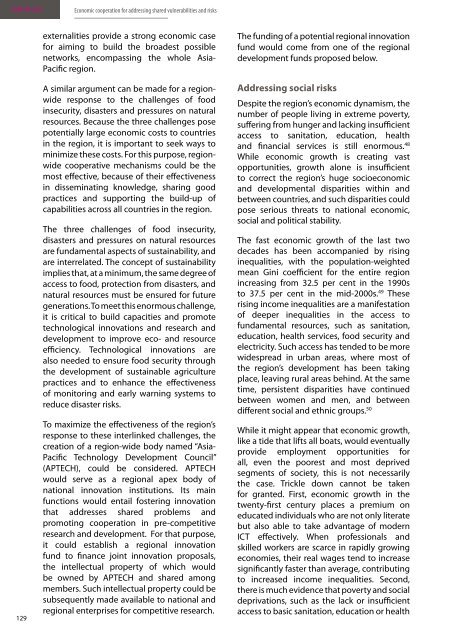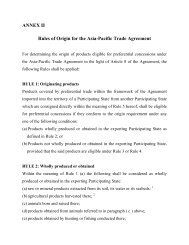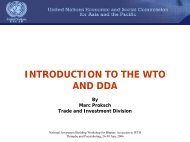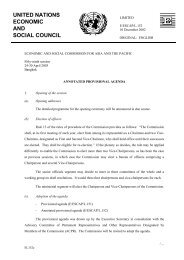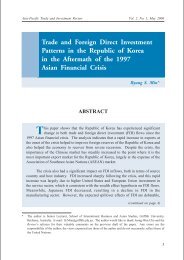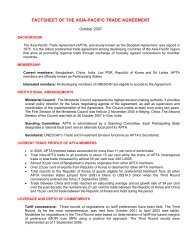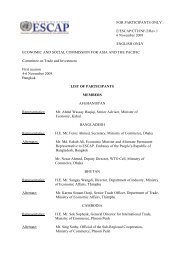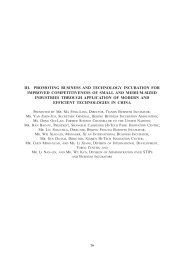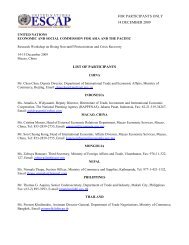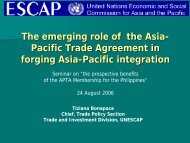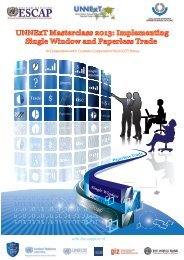Growing Together: Economic Integration for an Inclusive and - escap
Growing Together: Economic Integration for an Inclusive and - escap
Growing Together: Economic Integration for an Inclusive and - escap
You also want an ePaper? Increase the reach of your titles
YUMPU automatically turns print PDFs into web optimized ePapers that Google loves.
CHAPTER FIVE<br />
129<br />
<strong>Economic</strong> cooperation <strong>for</strong> addressing shared vulnerabilities <strong>an</strong>d risks<br />
externalities provide a strong economic case<br />
<strong>for</strong> aiming to build the broadest possible<br />
networks, encompassing the whole Asia-<br />
Pacific region.<br />
A similar argument c<strong>an</strong> be made <strong>for</strong> a regionwide<br />
response to the challenges of food<br />
insecurity, disasters <strong>an</strong>d pressures on natural<br />
resources. Because the three challenges pose<br />
potentially large economic costs to countries<br />
in the region, it is import<strong>an</strong>t to seek ways to<br />
minimize these costs. For this purpose, regionwide<br />
cooperative mech<strong>an</strong>isms could be the<br />
most effective, because of their effectiveness<br />
in disseminating knowledge, sharing good<br />
practices <strong>an</strong>d supporting the build-up of<br />
capabilities across all countries in the region.<br />
The three challenges of food insecurity,<br />
disasters <strong>an</strong>d pressures on natural resources<br />
are fundamental aspects of sustainability, <strong>an</strong>d<br />
are interrelated. The concept of sustainability<br />
implies that, at a minimum, the same degree of<br />
access to food, protection from disasters, <strong>an</strong>d<br />
natural resources must be ensured <strong>for</strong> future<br />
generations. To meet this enormous challenge,<br />
it is critical to build capacities <strong>an</strong>d promote<br />
technological innovations <strong>an</strong>d research <strong>an</strong>d<br />
development to improve eco- <strong>an</strong>d resource<br />
efficiency. Technological innovations are<br />
also needed to ensure food security through<br />
the development of sustainable agriculture<br />
practices <strong>an</strong>d to enh<strong>an</strong>ce the effectiveness<br />
of monitoring <strong>an</strong>d early warning systems to<br />
reduce disaster risks.<br />
To maximize the effectiveness of the region’s<br />
response to these interlinked challenges, the<br />
creation of a region-wide body named “Asia-<br />
Pacific Technology Development Council”<br />
(APTECH), could be considered. APTECH<br />
would serve as a regional apex body of<br />
national innovation institutions. Its main<br />
functions would entail fostering innovation<br />
that addresses shared problems <strong>an</strong>d<br />
promoting cooperation in pre-competitive<br />
research <strong>an</strong>d development. For that purpose,<br />
it could establish a regional innovation<br />
fund to fin<strong>an</strong>ce joint innovation proposals,<br />
the intellectual property of which would<br />
be owned by APTECH <strong>an</strong>d shared among<br />
members. Such intellectual property could be<br />
subsequently made available to national <strong>an</strong>d<br />
regional enterprises <strong>for</strong> competitive research.<br />
The funding of a potential regional innovation<br />
fund would come from one of the regional<br />
development funds proposed below.<br />
Addressing social risks<br />
Despite the region’s economic dynamism, the<br />
number of people living in extreme poverty,<br />
suffering from hunger <strong>an</strong>d lacking insufficient<br />
access to s<strong>an</strong>itation, education, health<br />
<strong>an</strong>d fin<strong>an</strong>cial services is still enormous. 48<br />
While economic growth is creating vast<br />
opportunities, growth alone is insufficient<br />
to correct the region’s huge socioeconomic<br />
<strong>an</strong>d developmental disparities within <strong>an</strong>d<br />
between countries, <strong>an</strong>d such disparities could<br />
pose serious threats to national economic,<br />
social <strong>an</strong>d political stability.<br />
The fast economic growth of the last two<br />
decades has been accomp<strong>an</strong>ied by rising<br />
inequalities, with the population-weighted<br />
me<strong>an</strong> Gini coefficient <strong>for</strong> the entire region<br />
increasing from 32.5 per cent in the 1990s<br />
to 37.5 per cent in the mid-2000s. 49 These<br />
rising income inequalities are a m<strong>an</strong>ifestation<br />
of deeper inequalities in the access to<br />
fundamental resources, such as s<strong>an</strong>itation,<br />
education, health services, food security <strong>an</strong>d<br />
electricity. Such access has tended to be more<br />
widespread in urb<strong>an</strong> areas, where most of<br />
the region’s development has been taking<br />
place, leaving rural areas behind. At the same<br />
time, persistent disparities have continued<br />
between women <strong>an</strong>d men, <strong>an</strong>d between<br />
different social <strong>an</strong>d ethnic groups. 50<br />
While it might appear that economic growth,<br />
like a tide that lifts all boats, would eventually<br />
provide employment opportunities <strong>for</strong><br />
all, even the poorest <strong>an</strong>d most deprived<br />
segments of society, this is not necessarily<br />
the case. Trickle down c<strong>an</strong>not be taken<br />
<strong>for</strong> gr<strong>an</strong>ted. First, economic growth in the<br />
twenty-first century places a premium on<br />
educated individuals who are not only literate<br />
but also able to take adv<strong>an</strong>tage of modern<br />
ICT effectively. When professionals <strong>an</strong>d<br />
skilled workers are scarce in rapidly growing<br />
economies, their real wages tend to increase<br />
signific<strong>an</strong>tly faster th<strong>an</strong> average, contributing<br />
to increased income inequalities. Second,<br />
there is much evidence that poverty <strong>an</strong>d social<br />
deprivations, such as the lack or insufficient<br />
access to basic s<strong>an</strong>itation, education or health


